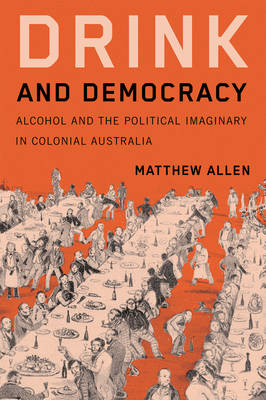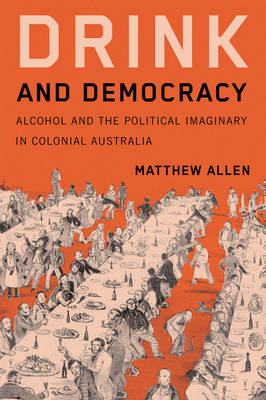
- Afhalen na 1 uur in een winkel met voorraad
- Gratis thuislevering in België vanaf € 30
- Ruim aanbod met 7 miljoen producten
- Afhalen na 1 uur in een winkel met voorraad
- Gratis thuislevering in België vanaf € 30
- Ruim aanbod met 7 miljoen producten
Zoeken
Drink and Democracy
Alcohol and the Political Imaginary in Colonial Australia Volume 12
Matthew Allen
€ 65,95
+ 131 punten
Omschrijving
The nineteenth-century spread of democracy in Britain and its colonies coincided with an increase in alcohol consumption and in celebratory public dinners with rounds of toasts. British colonists raised their glasses to salute the Crown in rituals that asserted fraternal equality and political authority. Yet these ceremonies were reserved for gentlemen, leaving others - notably women and Indigenous people - on the political margins. Drink and Democracy traces the development of democratic ideas in New South Wales through the history of public drinking and temperance. As the colony transformed from a convict autocracy to a liberal democracy, Matthew Allen argues, public drinking practices shaped the character of the emerging political order. The ritual of toasting was a symbolic display of restraint - drunkenness without loss of self-control - that embodied the claim to citizenship of white male settlers. Yet the performative sobriety of the temperance movement was also democratic, a display of respectability that politicized its supporters around a rival vision of responsible citizenship. Drink was a way to police the limits of the political realm. The stigma of female drunkenness worked to exclude women from the public sphere, while perceptions of heavy drinking among Aboriginal people cast them as lacking self-control and hence unworthy of political rights. Drink and Democracy reveals that long before the introduction of the franchise, colonists in Australia imagined themselves as citizens. Yet even as democracy expanded, drink marked its limits.
Specificaties
Betrokkenen
- Auteur(s):
- Uitgeverij:
Inhoud
- Aantal bladzijden:
- 306
- Taal:
- Engels
- Reeks:
Eigenschappen
- Productcode (EAN):
- 9780228024743
- Verschijningsdatum:
- 6/05/2025
- Uitvoering:
- Paperback
- Formaat:
- Trade paperback (VS)
- Afmetingen:
- 152 mm x 228 mm
- Gewicht:
- 458 g

Alleen bij Standaard Boekhandel
+ 131 punten op je klantenkaart van Standaard Boekhandel
Beoordelingen
We publiceren alleen reviews die voldoen aan de voorwaarden voor reviews. Bekijk onze voorwaarden voor reviews.








